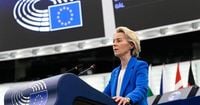As the European Parliament braces for another round of high-stakes confidence votes, European Commission President Ursula von der Leyen finds herself once again at the center of a political storm—though, by most accounts, she’s likely to weather it. The motions, set for a vote on Thursday, October 9, 2025, have been tabled by two of the Parliament’s most vocal factions: the far-left and the radical right. Despite the drama, the numbers and the political mood suggest von der Leyen’s position is all but secure.
According to AP, von der Leyen used her appearance before lawmakers in Strasbourg on Monday, October 6, to issue a stark warning: “We need to focus on what really matters, which is to deliver for Europeans.” She cautioned against falling for Russian President Vladimir Putin’s efforts to exploit and deepen divisions within the bloc, underscoring the threat posed by what she called Putin’s “obedient friends in Europe who are doing his work for him.” Her message was clear—unity is paramount at a time when Europe faces both external and internal threats.
“This is the oldest trick in the book, sow division, spread disinformation, create a scapegoat, all to turn Europeans against each other, to try to lower our guard while we fight each other,” von der Leyen told the assembly, as reported by AP. Her remarks set the tone for a debate that, while charged with criticism, seemed to acknowledge the gravity of the moment for the European project.
The censure motions themselves are the product of deep dissatisfaction from both ends of the political spectrum. The Left group has accused von der Leyen of “signing off on a number of detrimental trade deals” and failing “to act against the Israeli government’s systemic violations of international law in Gaza.” Meanwhile, the nationalist Patriots for Europe have insisted that migration “has exploded” under her leadership, threatening “our identity and security.” They also claim she has abandoned farmers and consumers and put food safety at risk with pro-environment policies.
Yet, as Bloomberg notes, the timing of these votes may be working in von der Leyen’s favor. With a French political crisis dominating headlines, the censure motions—serious as they are—have been somewhat overshadowed. Some in Brussels even suggest that von der Leyen is “feeling lucky for now,” at least as far as the parliamentary arithmetic is concerned.
Most political groups in the Parliament, according to Politico, have expressed reluctant support for von der Leyen’s Commission, even as they voice frustration with her record. The European People’s Party (EPP), her own political family and the largest in the chamber, has thrown its weight behind her. EPP leader Manfred Weber put it bluntly, calling the censure motions “ridiculous propaganda tools for [their] own campaigns,” and noting that his group would support the Commission even if “we can have different opinions” on specific policies.
Other centrist and pro-European groups, while stopping short of enthusiastic endorsement, have made it clear they will not back the censure attempts. Renew Europe’s leader Valérie Hayer accused “extremists and populists” of using the debate to spread division, though she also pressed von der Leyen to “deliver acts and concrete results,” saying, “the pro-European majority is not happy.” The Socialist group’s head Iratxe García echoed this sentiment, criticizing the use of censure as a campaign tool and rebuking von der Leyen for “using those who deny climate change and women’s rights” to secure a majority. García insisted that her group would keep pushing for negotiation and concrete results, particularly on human rights and a ceasefire in Gaza.
The Greens, too, voiced their concerns. Co-chair Terry Reintke warned that von der Leyen risked weakening the EU’s climate and social measures, and reproached her for lack of action on “Israel, climate, social and housing crises, and the deteriorating rule of law.” Still, Reintke acknowledged that a censure motion was “not the right instrument in the current geopolitical context.” Even the European Conservatives and Reformists, while critical of von der Leyen’s handling of climate and social crises, chose not to back the censure, with group head Nicola Procaccini allowing his delegation to vote as they saw fit.
On the other hand, the far-left and the Patriots for Europe remain adamant in their opposition. Martin Schirdewan of The Left stated, “after so many failures, some still want to give her another chance — we won’t,” summarizing their view that the Commission has lost credibility on Gaza, trade, and social justice. Jordan Bardella, president of Patriots for Europe, accused von der Leyen of “ceding to the Americans,” betraying farmers, and imposing “11 new bureaucratic tests per day.” He insisted, “Europe is a civilisation, not a machine of norms.”
The procedural reality, however, is that passing a censure motion requires a two-thirds majority in the Parliament—a threshold that’s all but unreachable given the current configuration. Centrist and mainstream parties, despite their grievances, have little appetite for what would amount to an institutional crisis. As Manfred Weber emphasized, a censure motion is “a serious instrument” that should not be wielded for campaign purposes.
The backdrop to this week’s drama is von der Leyen’s previous brush with parliamentary censure just three months ago. In July 2025, she comfortably survived a similar vote—the first such challenge in over a decade. That occasion was marked by heated debate over “Pfizergate,” the controversy surrounding her unpublished text messages with a pharmaceutical CEO during the Covid-19 pandemic. This time, the debate has been less about scandal and more about the direction of the EU, with fewer surprises and a more conciliatory tone on all sides, according to Politico.
Still, the votes have served as a lightning rod for criticism of von der Leyen and her European People’s Party. Some accuse them of “cozying up to the hard right” to advance their agenda, while others argue that the Commission has not done enough to address pressing issues like climate change, migration, and the ongoing crises in Gaza and Ukraine.
Von der Leyen, for her part, has sought to rise above the fray, framing the debate as a choice between unity and division. She has repeatedly stressed the need for the EU to “focus on what really matters”—security, jobs, and competitiveness—while warning that adversaries like Putin are eager to exploit any sign of weakness.
As the Parliament prepares to vote, few expect an upset. The censure motions are likely to be rejected by a comfortable margin, with the pro-European majority holding firm despite their reservations. Yet the episode has laid bare the growing tensions within the EU, and the challenge of governing a bloc as diverse—and as politically fractious—as Europe in 2025.
In the end, von der Leyen’s survival seems assured, but the message from Strasbourg is unmistakable: the Commission may be safe for now, but its leader faces mounting pressure to deliver real results for Europe’s 450 million citizens.



